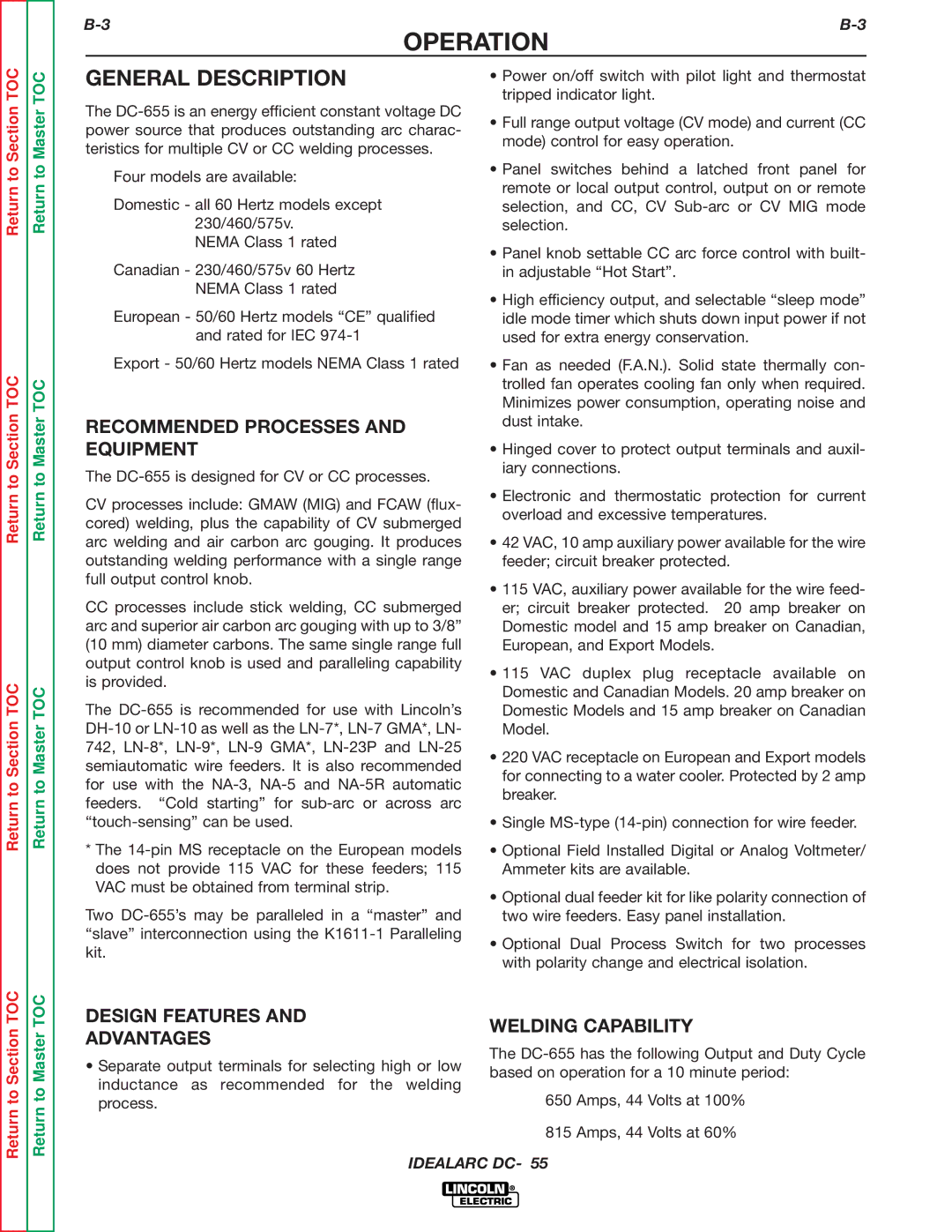
OPERATION
Return to Section TOC
Return to Section TOC
Return to Section TOC
Return to Master TOC
Return to Master TOC
Return to Master TOC
GENERAL DESCRIPTION
The
Four models are available:
Domestic - all 60 Hertz models except 230/460/575v.
NEMA Class 1 rated
Canadian - 230/460/575v 60 Hertz
NEMA Class 1 rated
European - 50/60 Hertz models “CE” qualified and rated for IEC
Export - 50/60 Hertz models NEMA Class 1 rated
RECOMMENDED PROCESSES AND EQUIPMENT
The
CV processes include: GMAW (MIG) and FCAW (flux- cored) welding, plus the capability of CV submerged arc welding and air carbon arc gouging. It produces outstanding welding performance with a single range full output control knob.
CCprocesses include stick welding, CC submerged arc and superior air carbon arc gouging with up to 3/8” (10 mm) diameter carbons. The same single range full output control knob is used and paralleling capability is provided.
The
*The
Two
•Power on/off switch with pilot light and thermostat tripped indicator light.
•Full range output voltage (CV mode) and current (CC mode) control for easy operation.
•Panel switches behind a latched front panel for remote or local output control, output on or remote selection, and CC, CV
•Panel knob settable CC arc force control with built- in adjustable “Hot Start”.
•High efficiency output, and selectable “sleep mode” idle mode timer which shuts down input power if not used for extra energy conservation.
•Fan as needed (F.A.N.). Solid state thermally con- trolled fan operates cooling fan only when required. Minimizes power consumption, operating noise and dust intake.
•Hinged cover to protect output terminals and auxil- iary connections.
•Electronic and thermostatic protection for current overload and excessive temperatures.
•42 VAC, 10 amp auxiliary power available for the wire feeder; circuit breaker protected.
•115 VAC, auxiliary power available for the wire feed- er; circuit breaker protected. 20 amp breaker on Domestic model and 15 amp breaker on Canadian, European, and Export Models.
•115 VAC duplex plug receptacle available on Domestic and Canadian Models. 20 amp breaker on Domestic Models and 15 amp breaker on Canadian Model.
•220 VAC receptacle on European and Export models for connecting to a water cooler. Protected by 2 amp breaker.
•Single
•Optional Field Installed Digital or Analog Voltmeter/ Ammeter kits are available.
•Optional dual feeder kit for like polarity connection of two wire feeders. Easy panel installation.
•Optional Dual Process Switch for two processes with polarity change and electrical isolation.
Return to Section TOC
Return to Master TOC
DESIGN FEATURES AND
ADVANTAGES
•Separate output terminals for selecting high or low inductance as recommended for the welding process.
WELDING CAPABILITY
The
650 Amps, 44 Volts at 100%
815 Amps, 44 Volts at 60%
IDEALARC
